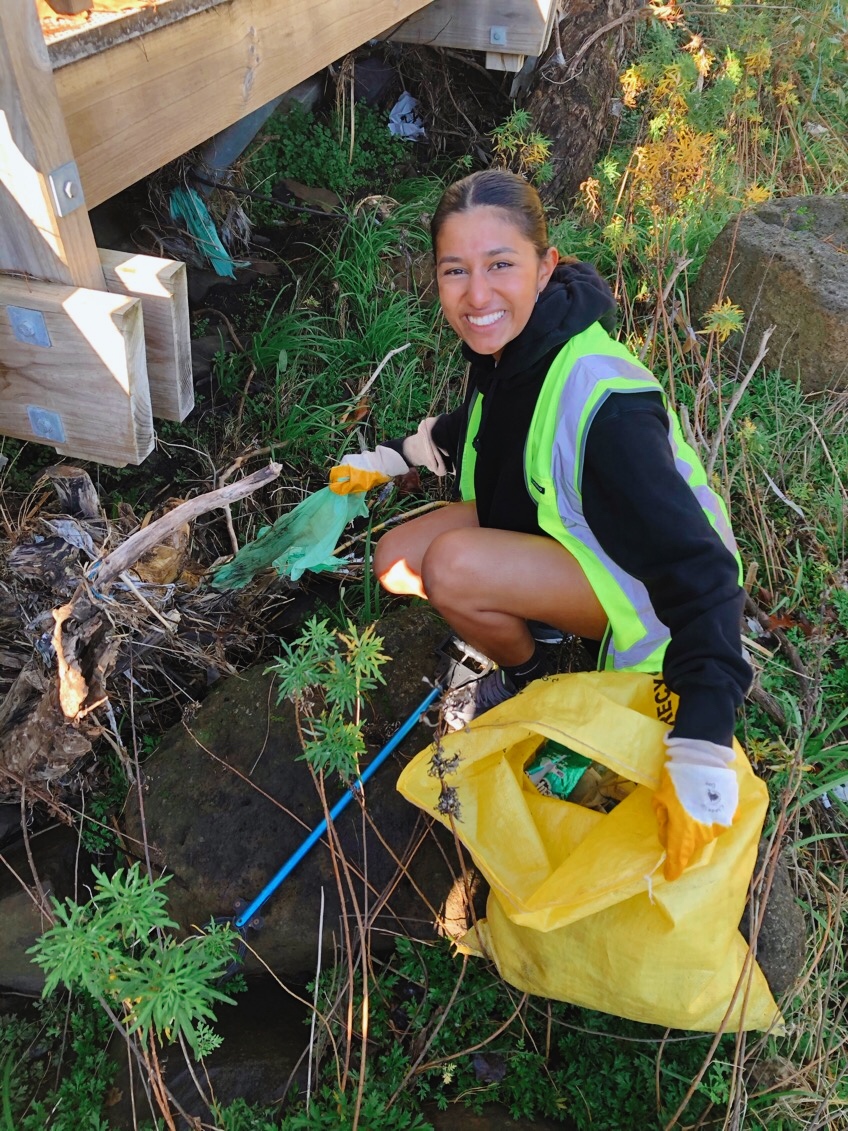Environmental action is one of the most pressing concerns for young people, but it can feel big and overwhelming to start with. Candace Colaco is a young person in Brimbank who started the Little Litter Project, a clean-up initiative to encourage her community to take action on local litter.
“I would hear on the news, or you'd see in the media about something to do specifically with climate change when it came to environmental issues. Even the climate change school protests that would happen regularly. But there was nothing on a smaller scale, or [about] environmental issues we are faced with day-to-day.”
Every day as Candace would drive to and from university, she was frustrated by all the litter she would see along the way. She tried contacting various local authorities but each said it was the other’s responsibility to deal with. Candace decided to start organising community clean-up events herself, and so the Little Litter Project was born.
Candace shares how she extended the Project online, how she’s made it COVID-safe, and her tips to other young people who want to do something similar.
Taking hands-on action online
The Little Litter Project had great momentum for in-person clean-ups, until the 2020 lockdowns brought things to a halt.
“Before the pandemic, I feel like we were becoming really good when it came to reducing our waste…And then [with COVID-19] we were hit with a plastic pollution wave with everything being single use, like a mask being single use out the gloves being single use. Plastic masks, gloves and takeaway packaging were what we were faced with.”
Instead of running in-person events, Candace had to get creative. She did things like:
- Educate her social media followers about what they could control about their waste at home during lockdown. Candace dedicated a lot of time to getting people to consider the products they were using each day at home. For example, different councils have different rules about the recycling they collect. So she encouraged people to find out what is recyclable through their local collection, and what the alternatives are for things that aren’t.
- Create varied content that gets people involved. Candace knows the key to action is keeping people engaged. She used features of social media that people could respond to, like polls and reels. She also started doing challenges, like a 'swap' challenge where people post photos of what sustainable alternatives they were using at home.
- Leverage other platforms as well, like connecting with online events to speak on panels, and being a guest speaker on podcasts. Candace also found this to be a great skills-building experience to help her achieve her goal of speaking at schools about waste.
“I didn't just like put the Little Litter Project on hold or stop it because of COVID,” she explains. “I just found other ways to get the message out there or educate people.”
Environmental action in COVID-normal
When Victoria’s restrictions eased, the Little Litter Project got back in action with local clean-ups. Candace recognises that now people might feel nervous about picking up rubbish – there’s already the idea that it’s ‘dirty’, but now that’s even more significant with fears of COVID contamination.
“Beforehand, I used to provide all the gloves and clean-up material. But now I just prefer people to bring their own, just to be a bit more COVID safe.” she shares. “But on top of that, it’s generally quite COVID-safe because people are usually quite spaced out, you’re outdoors!”
But COVID-normal environmental action is not just about getting back outside again in a physically COVID-safe way. It’s also about reconnecting with others and doing something positive.
“Especially with the youth that attend the clean-ups, it’s definitely had a very positive impact on them,” Candace says. “When you think of a clean-up you just automatically think of rubbish and the dirtiness! But once you are there with a group of people, it’s like a social event as well. You come together, you’re doing your part. You’re actually there. It’s so satisfying. Cleaning up and getting bags and bags and bags. I feel like people actually leave at the end of the day feeling like they've had some kind of impact! … Or with the mindset of, ‘if we didn’t do this today, then there would’ve been several bags of rubbish that were still out there! It’s a feel-good moment for many people.”
That ‘feel-good moment’ is so valuable after how demoralising the pandemic, bushfires and ongoing climate inaction has felt for young people. Positive, direct action at a local level can help you regain some feelings of control and accomplishment.
Candace adds, “a lot of people that attend my clean-ups keep coming back every single time because they genuinely enjoy it. It’s easy to get demoralised, because you do see a lot of rubbish. And it’s a lot to take in. But at the same time, I think the environment you’re in and people you meet... You leave there knowing that you've done something good.”
Candace’s advice to other young people
If you’re interested in organising local climate action in your own area, Candace says starting small will have a bigger impact than you think.
“My idea at the time just seemed so stupid. I kept thinking, as if people my age are going to want to be following a page about waste and recycling. [But] you don’t actually know until you put yourself out there...you’d be surprised at the amount of support that you get from all kinds of people.”
In Candace’s words, “I feel like there’s so many things that could hold you back. But at the same time, there’s so many things that can push you forward.”
This story is part of our Learning from COVID-19 series, featuring the creativity and adaptions of young people and youth workers. Check out our other stories or share your feedback.




